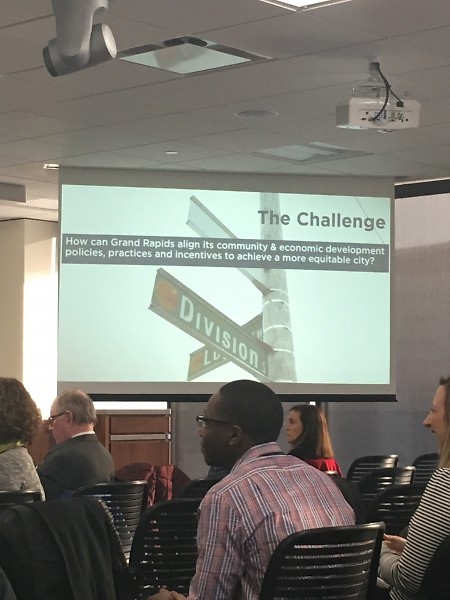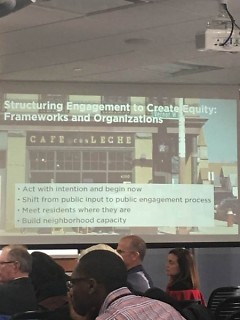On Thursday morning, a panel of experts presented findings on how to incorporate equity into the development of public land in Grand Rapids. The presentation was delivered at City Hall by members of the Rose Center for Public Leadership in Land Use, jointly operated by the National League of Cities and the Urban Land Institute.
As part of a yearlong fellowship, Grand Rapids Mayor Rosalynn Bliss; Kristopher Larson, president and CEO of Downtown Grand Rapids Inc.; Josh Naramore, manager of Mobile GR and Parking Department and Kara Wood, Managing Director of Economic Development for the City of Grand Rapids were selected as 2017 Daniel Rose Fellows. The three other cities that are a part of the class of 2017 are Anchorage, Alaska, San Jose, California and Washington, D.C.
The national experts spent the week in Grand Rapids to learn more about community plans, learn about local development tools and programs and conduct interviews with key stakeholders. Thursday’s presentation was the first time Grand Rapids’ Rose fellows were hearing the experts’ findings.
The presentation sought to answer the following question: How can Grand Rapids align its community and economic development policies, practices and incentives to achieve a more equitable city?
Why equity? The experts laid out the following reasons why equity is an investment:
- Prioritizing equity has a big cost, but it also has big benefits.
- Equity improves fiscal health.
- Equity increases city competitiveness.
- Equity improves pro-formas (bottom line)
- Equity (done right) lifts all boats.
- Equity is risk management.
“If a city is inequitable, that means that less people are able to contribute in the way that they could because they don’t have the jobs, they don’t have the income,” said Calvin Gladney, managing partner of Washington, D.C.-based Mosaic Urban Partners, a public/ private partnership consultant and real estate development firm. “If you’re a private sector person, a for-profit health institution and the like, you care about these things, and so you want it to be more equitable.”
Antonio Fiol-Silva of SITIO Architecture + Urbanism said sixty interviews were conducted. There was broad recognition that inequities exist in the city, he said.
“In this community, all need to have access to opportunity for the community to succeed,” he said.
The panelists also noted that it will take cooperation and assistance from the budget of multiple agencies and multiple funding sources for equity initiatives to be implemented successfully.
During the presentation, numerous community goals were discussed, including workforce development, transportation and the use of development incentives. Experts noted workforce development is critical to equity.
As the process of implementing solutions begins, panelists noted that “engagement is essential to equity.” Some critical steps to structure engagement and create equity were shared:
- Act with intention and begin now.
- Shift from public input to public engagement process.
- Meet residents where they are.
- Build neighborhood capacity.
The panelists assigned “homework” to the four Rose Fellows in order to keep momentum moving. In their final conclusions, they noted in the presentation that “Equity is an investment with a positive value proposition for everyone. Equity goals need to be clearly defined and measurable; neighborhood engagement is critical, and finally, achieving equity is an economic imperative.”
The Rapidian, a program of the 501(c)3 nonprofit Community Media Center, relies on the community’s support to help cover the cost of training reporters and publishing content.
We need your help.
If each of our readers and content creators who values this community platform help support its creation and maintenance, The Rapidian can continue to educate and facilitate a conversation around issues for years to come.
Please support The Rapidian and make a contribution today.

